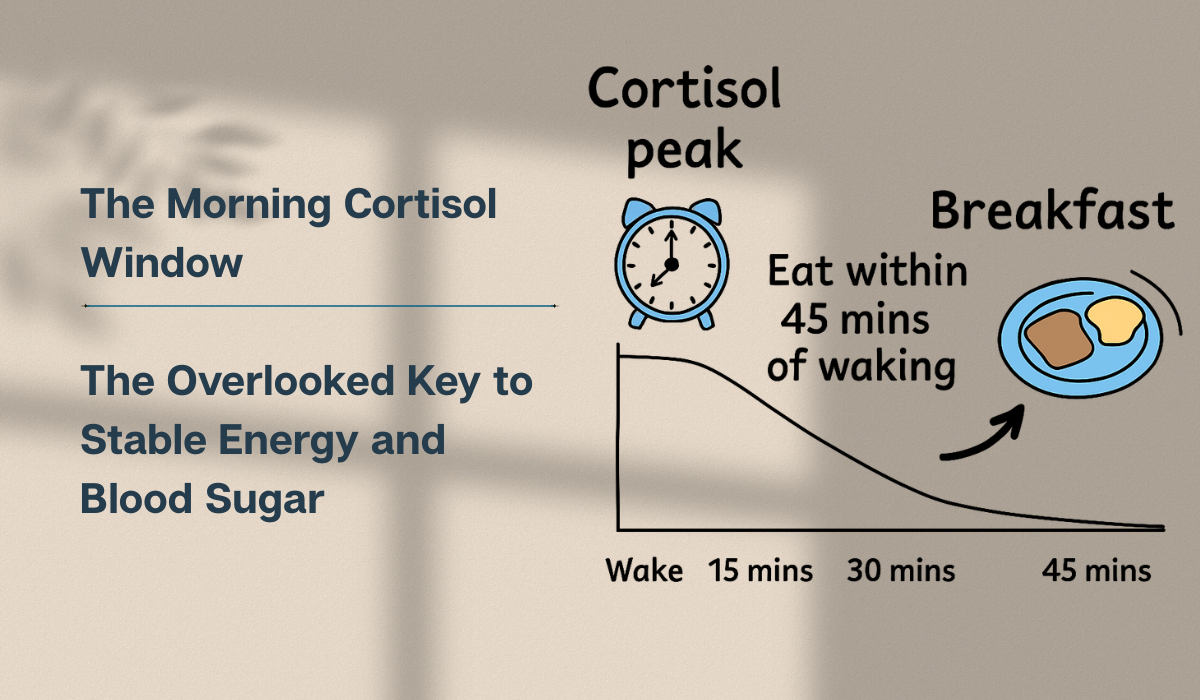You’re eating clean.
You’re mindful of your sugar intake.
But still, your energy crashes mid-morning, your cravings kick in, or your blood sugar readings fluctuate despite a “perfect” diet.
What if the problem isn’t what you’re eating — but when?
What Is the Morning Cortisol Window?
Your body follows a 24-hour internal clock called the circadian rhythm.
Right after waking, your body naturally releases a surge of cortisol — often misunderstood as a “stress hormone” but actually vital for energy regulation, fat metabolism, immune function, and blood sugar control.
This spike is called the Cortisol Awakening Response (CAR) — and it’s designed to:
-
Wake you up
-
Mobilize glucose for brain and muscle function
-
Set your metabolism in motion for the day
BUT—if you don’t fuel yourself within this window, your body starts using stress pathways to compensate.
That means: blood sugar drops, cravings rise, and metabolic stability suffers.
Why Skipping or Delaying Breakfast May Be Harming You
Many people — especially those trying to lose weight or manage sugar levels — skip breakfast or delay it until much later in the day.
But here’s what science and clinical practice show:
-
Skipping food during the cortisol peak increases blood sugar volatility
-
For women, it worsens hormonal imbalance, leading to mood swings, fatigue, and period-related issues
-
It can increase belly fat storage due to prolonged cortisol dominance
-
And it creates a false hunger signal — where you end up overeating later in the day
How to Support Your Morning Cortisol for Energy and Sugar Stability
This isn’t about eating a heavy breakfast.
It’s about giving your body a cue that energy is available — and aligning that signal with your natural cortisol rhythm.
Here’s how to do it: Within 45 minutes of waking up:
-
Eat a small protein-fat combo (no need for full meal)
-
Example: 5 soaked almonds + 1 boiled egg
-
Or: 1 moong + coconut chilla
-
Or: 1 tbsp ghee on small millet roti
-
Avoid:
-
Only caffeine on an empty stomach
-
Fruit-only breakfasts (spikes insulin too quickly)
-
Delaying your first bite until 10–11 AM (especially for women, thyroid, or PCOS)
Bonus Tip: Get Sunlight
Morning light exposure helps regulate cortisol and aligns your circadian rhythm.
Stand at your window or walk outside for 5–10 minutes — no sunglasses, no screen.
Who Needs This the Most?
-
Women with fatigue, PCOS, PMS, or mood swings
-
Clients with high fasting blood sugar or post-meal crashes
-
Anyone who feels tired after “eating right”
-
People trying intermittent fasting but feeling worse
Bottom Line:
You don’t need more superfoods.
You don’t need stricter diets.
You need to align your eating with your hormones.
Because nutrition isn’t just what you eat — it’s when your body is ready to receive it.
At IntuiWell, we design meal timings and plans that sync with your internal clock — helping you reset metabolism, hormones, and energy with practical, personalized nutrition.



